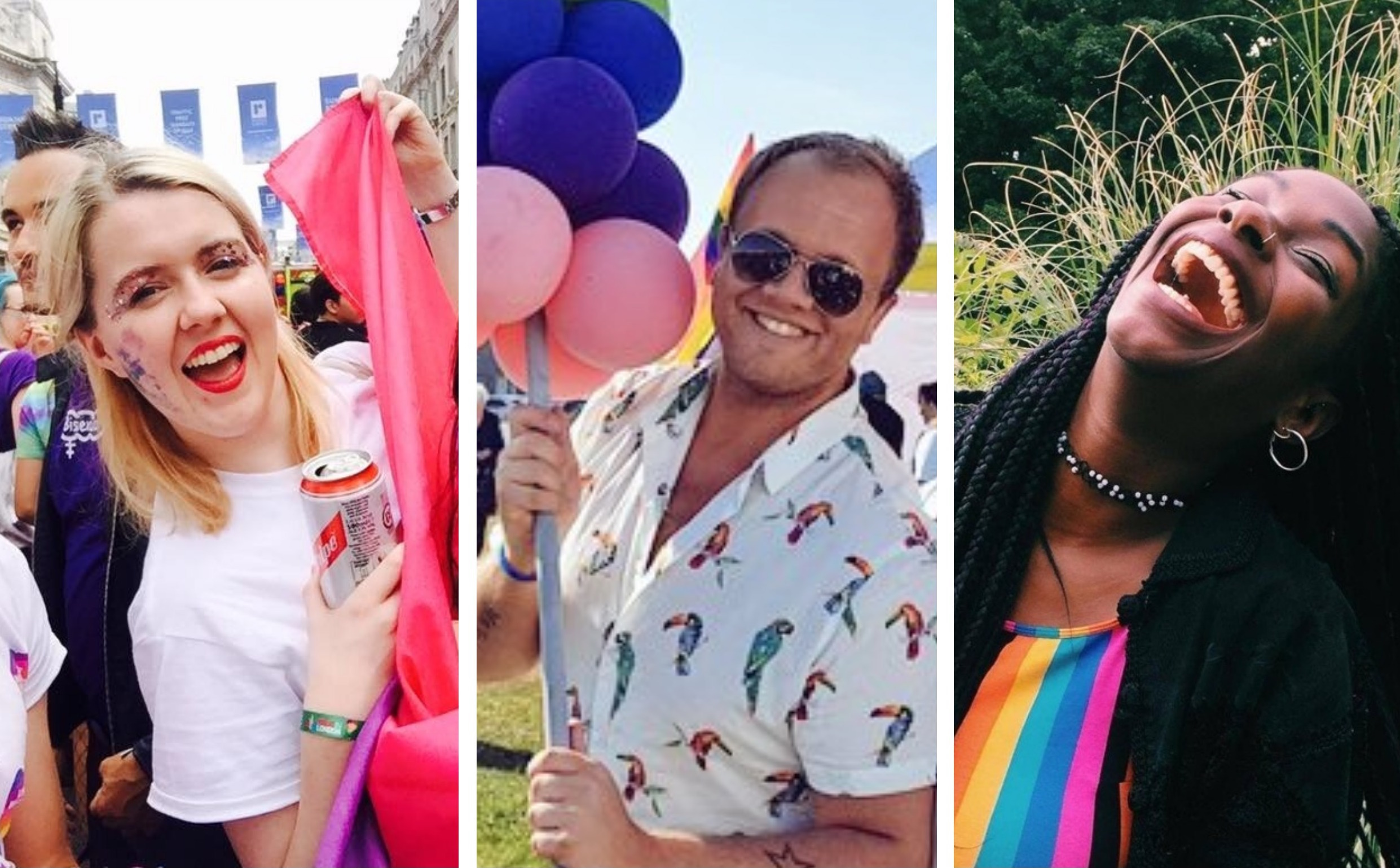It’s been a rocky few years for Pride. Last year, the London event hit the headlines for initially not including a single bisexual group in the march (though they later backtracked), and this year Sheffield Pride was slammed for saying the gathering was merely a ‘celebration’, not a protest. Again, they later apologised.
However, a couple of things about Pride aren’t up for debate. To put it simply, Pride is about our human rights. It’s about the rights we should all have, just by virtue of being alive, regardless as to whether we’re straight, gay, bisexual, non-binary, trans, asexual or anywhere else on the spectrum of gender and sexuality.
It’s about the right to be treated equally, something which is a cornerstone of our human rights. It’s about the right not to be discriminated against, the right to a family life, and the right to justice. Most of all, it’s about being empowered to know that these rights exist and that they protect you.
Beyond that, Pride means a lot of different things to a lot of different people. We spoke to ten people from the lesbian, gay, bi, and trans communities, about just what Pride means to them.
‘Pride Gives LGBT+ People the Chance to Unite’
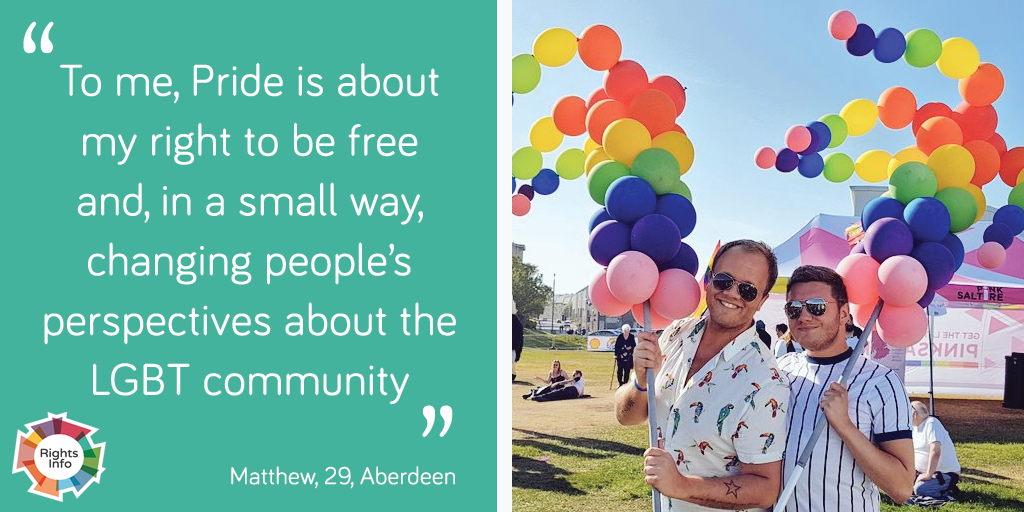
Matthew and his partner Lee at Grampian Pride. (Image Credit: Matthew Weston / Jem Collins)
“Pride gives LGBT+ people a chance to unite – and throw one helluva good party that everyone can be part of – regardless of their sexual orientation, age, race or anything else.
We can throw one helluva good party that everyone can be part of, regardless of their sexual orientation, age, race, or anything else.
“It’s about my right to be free; to be part of challenging and – in a small way – changing people’s perspective of the LGBT community.”
Matthew Weston is 29 and lives in Aberdeen. You can follow him on Twitter and Instagram.
‘For Gay Muslims, It’s a Way to Feel a Part of Something’
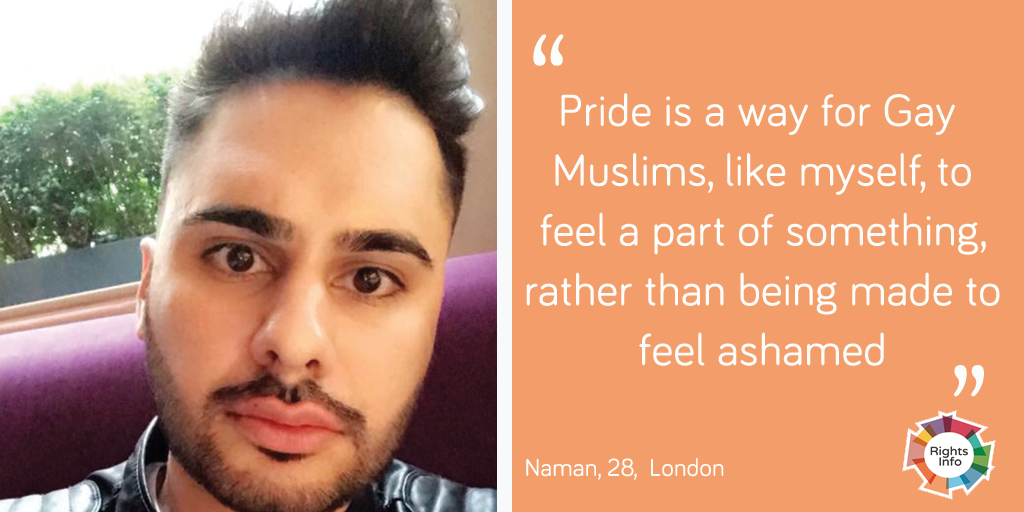
Image Credit: Naman Parvais / Jem Collins
“Pride is a way for gay Muslims like myself to feel a part of something, feeling united amongst other people who are LGBTQ, rather than being made to feel ashamed.
I just wish we could express ourselves all year round, rather than just Pride season.
“I just wish we could express ourselves all year round, rather than just Pride season, but hey, that’s a work in progress.”
Naman Parvaiz is 28 and from London. You can follow him on Twitter.
‘It’s Really Important that the Bisexual Community Marched’
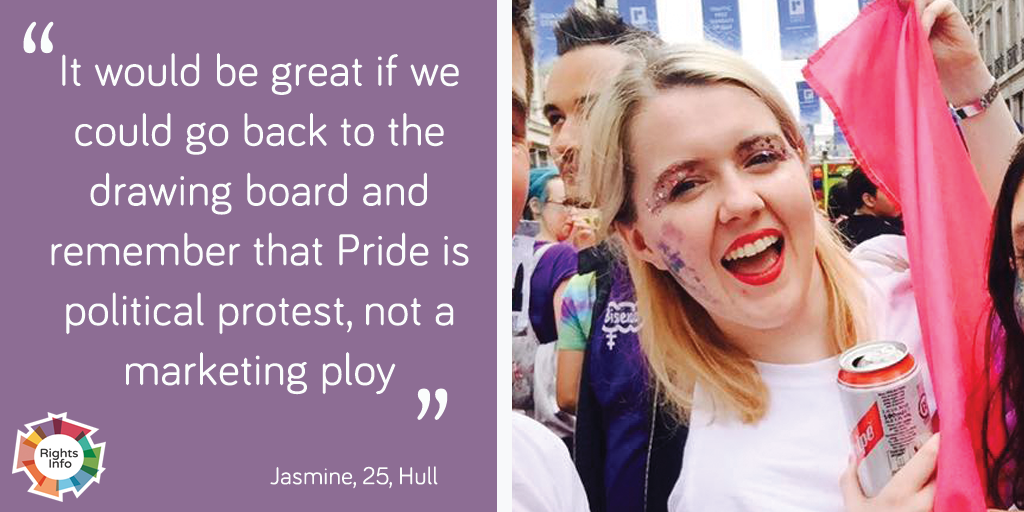
Jasmine marching at Pride in London last year. (Image Credit: Jasmine Andersson / Jem Collins)
“It was really important that the bisexual community marched last year because we were nearly missed off the list. In spite of the rampant commercialisation that now defines Pride, bi people were still not given a space to march.
It’s about our right to access the exact same facilities and social rights in the exact same way straight people do.
“When we marched, a tannoy announcer joked that we couldn’t make our minds up, and I know that our presence is needed more than ever. I think it would be great if we could get back to the drawing board and remember that Pride is a political protest, not a marketing ploy.
“It’s about our right to access the exact same facilities and social rights in the exact same way straight people do.”
Jasmine Andersson is 25 and is from Hull. You can follow her on Twitter.
‘Surely Not All BAME People Are Hidden Or Closeted?’
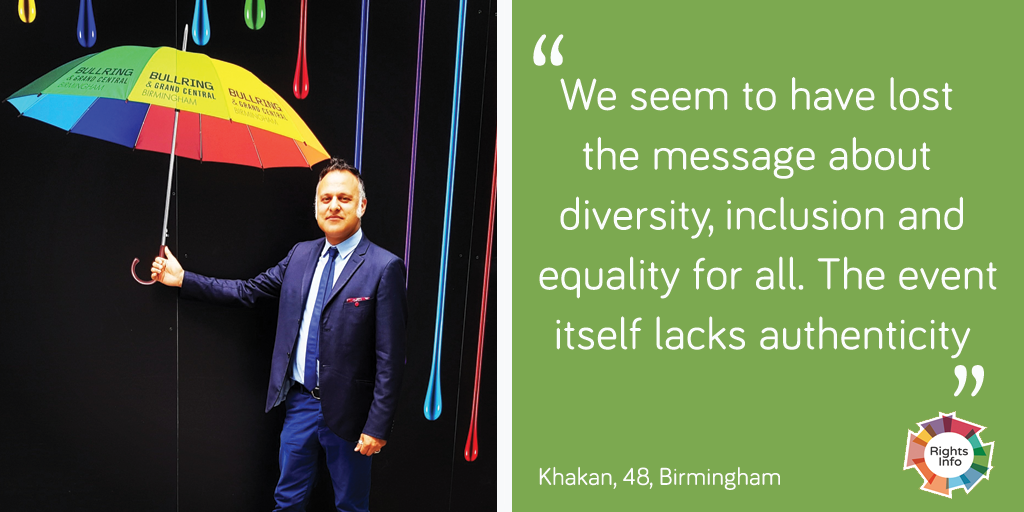
Image Credit: Khakan Qureshi / Jem Collins
“It’s a fun day for all, but we seem to have lost the message about diversity, inclusion and equality for all. Pride does not represent the diversity within our multicultural society.
“We pride ourselves on being multicultural but, within the event itself, it lacks authenticity. I don’t see many BAME LGBT stars entertaining or speaking to the crowd. Surely not all BAME LGBT+ people are hidden or closeted?
We pride ourselves on being multicultural, but within the event itself, it lacks authenticity
“We’re the rainbow-coloured A-Z of the sexual spectrum. Let’s remember Pride was about everyone who did not have a voice, but were compelled to make their voices heard.”
Khakan is 48 and lives in Birmingham. You can follow him on Twitter and Facebook.
‘It Was a Day of Celebration. But Far More Importantly, Pride is a Protest’
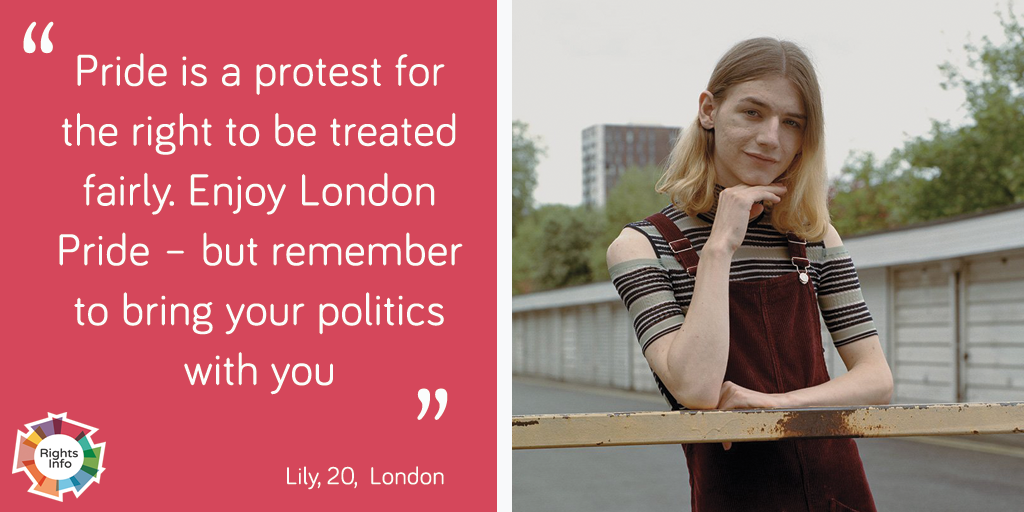
London Pride in 2017 was Lily’s first ever pride. Image Credit: Lily Magdian / Jem Collins
“London Pride 2017 was my first ever pride, marking 50 years since the partial decriminalization of homosexuality.
“It was a day for celebration, but speaking to a gay man who felt unable to come out to his family reminded me that – far more importantly – Pride is a protest for the right to be treated fairly.
Speaking to a gay man who felt unable to come out to his family reminded me that Pride is a protest.
“I hope you enjoy London Pride 2018 but remember to bring your politics with you. Otherwise, it becomes just a marketing opportunity at an event that last year had multiple airline blocks, but not a single bisexual one.”
Lily is 20 and lives in London. You can follow her on Twitter.
‘Gay Women Don’t Have a Platform to Show The Different Sides To Them’
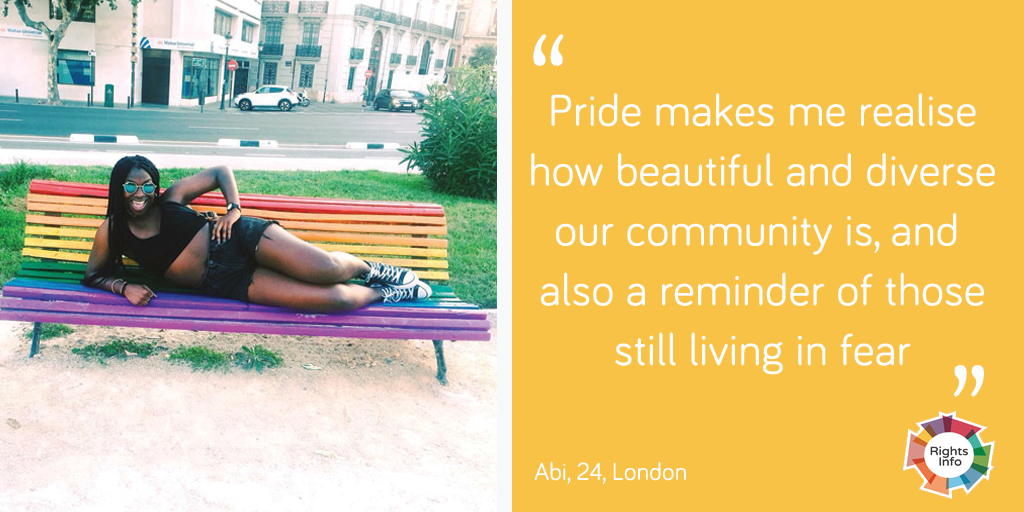
Image Credit: Abi Macintosh / Jem Collins
“Pride makes me realise how beautiful and diverse our community is, and also is a reminder that there are members of our community who are still living in fear.
“It’s a lot more multifaceted than just telling the stories of gay white men. I think generally the stories that are told are of gay white men who have lots of money and live flamboyant lives, but there are lots of other people out there. Gay women don’t have a platform to show the different sides to them.
I’m black and I’m a lesbian. Even now, I can’t see that reflected in the media.
“When I come out to people they say, ‘Oh, you don’t look like what I thought a lesbian would look like’. That’s something I struggled with when I was figuring it out when I was younger because you want to see yourself reflected in the media and I’m black and I’m a lesbian. Even now, I can’t see that reflected in the media. There are friends that I have known for years that I haven’t actually officially come out to.”
Abi is 24 and lives in London. You can follow her on Twitter.
‘It’s the Chance to be With My Girlfriend in Public Without Fear of Judgment’
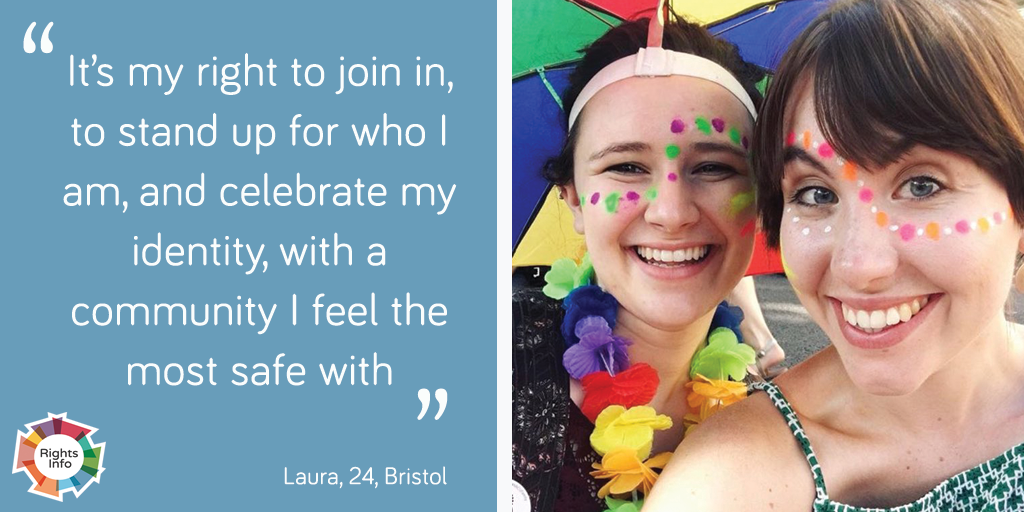
Laura (R) with her girlfriend. Image Credit: Laura Slingo / Jem Collins
“As a bisexual, Pride is a chance for me to be with my girlfriend in public without fear of judgement. No matter how progressive the world is becoming, every single day we’re stared at for holding hands walking down the street, simply because it’s an unusual sight for many.
“While the stares might still happen at Pride, I care much less, because I’m surrounded by my extended family; a welcoming LGBTQ+ community.
No matter how progressive the world is becoming, every single day we’re stared at for holding hands walking down the street.
“But it’s still scary heading into London for Pride – out of fear that an incident similar to that at Pulse will happen. So while there is no fear of judgement at Pride, I do fear for my life. But I won’t let that stand in the way of celebrating who I am with thousands of others like me.
“Today, Pride is a hybrid of a protest and a celebration. It’s my right to join in, to stand up for who I am and celebrate my identity, with a community that I feel the most safe and comfortable with.”
Laura is 24 and lives in Bristol. You can follow her on Twitter.
‘Pride is the Chance to Thank Those Who Fought – And Are Still Fighting’
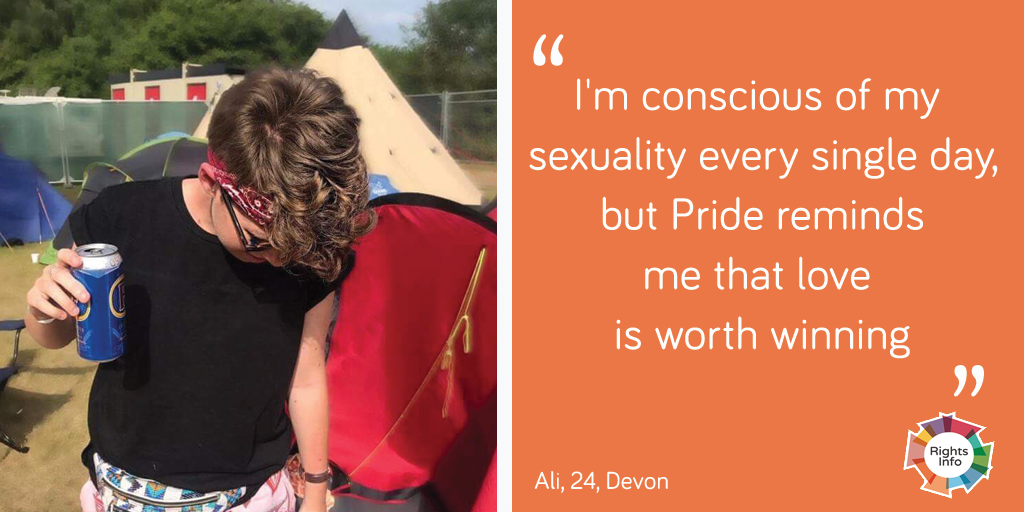
Image Credit: Ali Thorne / Jem Collins
“Pride is the chance to thank all those who fought, and are still fighting for our rights. For me, to live the life I want to live.
It reminds me that love is worth winning.
“I’m conscious of my sexuality every single day, but having a massive party to celebrate reminds me that love is worth winning.”
Ali Thorne is 24 and lives in Cardiff. You can follow her on Twitter.
‘It’s About My Right To Be Human’
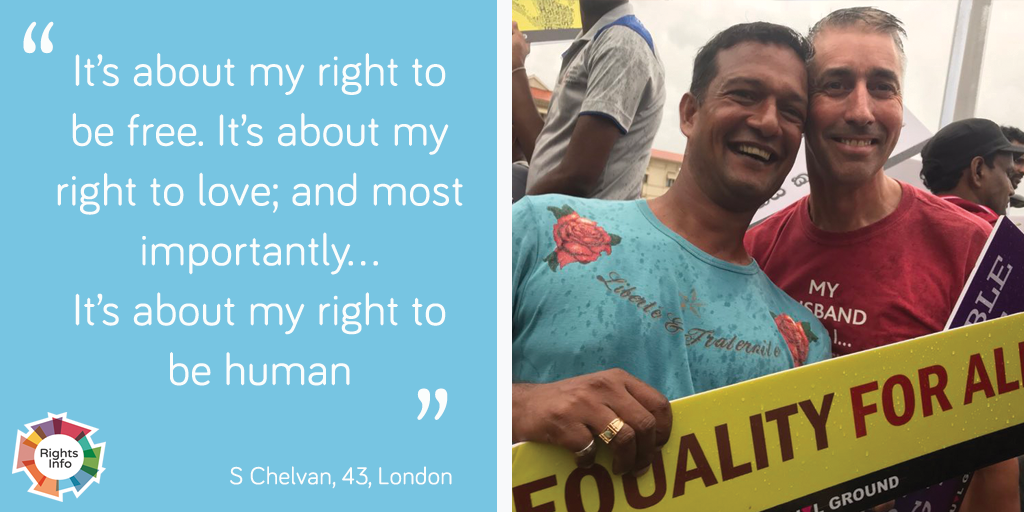
S Chelvan (L) at Pride. Image Credit: S Chelvan / Jem Collins
“It’s about my right to be free, it’s about my right to love; and most importantly…It’s about my right to be human.
It’s about my right to be free.
“Those three sentences summarise what Pride means to me.”
S Chelvan is 43 and lives in London. You can follow him on Twitter.
‘I Want to Feel Secure in my Orientation, Despite Other People’s Judgements’
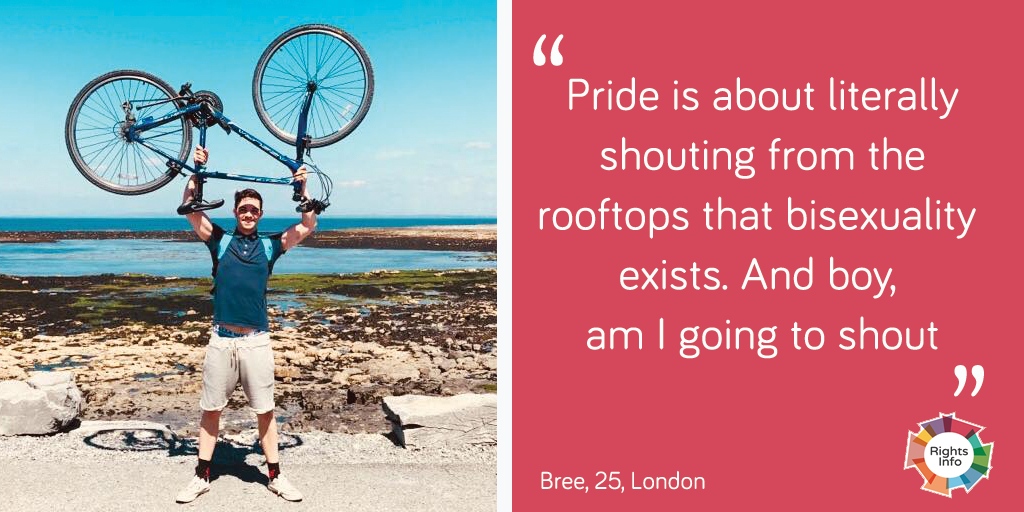
Image Credit: Bree Allegretti / Jem Collins
“Pride is many things to me personally. Most importantly, it is about all the different LGBT+ communities coming to stand together as one.
We need to take a look at ourselves and help build each other up before we start berating the rest of society for not being so inclusive.
“With such a lack of bisexual representation in previous years, it has been encouraging to see this year’s organisers take the issue seriously. We need to take a look at ourselves and help build each other up before we start berating the rest of society for not being so inclusive.
“But as a bisexual man, I will also be thinking of something a bit more personal and fundamental: wanting to feel secure in my orientation, despite other people’s judgements. To me, Pride is about literally shouting from the rooftops that bisexuality exists. And boy, am I going to shout.”

